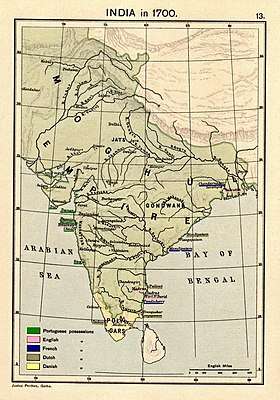Polygar
Polygar (also spelled Palegara, Palaiyakkarar, Poligar, Palegaadu, Palegar, or Polegar) was the feudal title for a class of territorial administrative and military governors appointed by the Nayaka rulers of South India (notably Vijayanagara Empire, Madurai Nayakas and the Kakatiya dynasty) during the 16th–18th centuries.

The Polygars of Madurai Country were instrumental in establishing administrative reforms by building irrigation projects, forts and religious institutions. The Polygars who worshipped the goddess Kali did not allow their territory to be annexed by Aurangzeb.
Their wars with the British East India Company after the demise of the Madurai Nayakas is often regarded as one of the earliest struggles for Indian independence. The British hanged many and banished others to the Andaman Islands. Veerapandya Kattabomman, Maveeran Alagumuthu Kone, Puli Thevar, Dheeran Chinnamalai, Maruthanayagam Pillai,the Marudu brothers and Uyyalawada Narasimha Reddy were some notable Polygars who rose up in revolt against the British rule in South India. The war against the British forces predates the Indian rebellion of 1857 in Northern India by many decades but is still largely given less importance by historians.
Role
The Polygar's role was to administer their Palaiyams (territories) from their fortified centres. Their chief functions were to collect taxes, maintain law and order, run the local judiciary, and maintain a battalion of troops for the king.
They served as regional military and civil administrators. In turn they were to retain 1⁄4 of the revenue collected as tax, and submit the remaining to the king's treasury. The Polygars also at times founded villages, built dams, constructed tanks and built temples. Also the rulers taxed regions according to the cultivable and fertility of the land. Often several new rainwater tanks were erected in the semi-arid tracts of western and southern Tamil Nadu.
Their armed status was also to protect the civilians from robbers and dacoits who were rampant in those regions and from invading armies which often resorted to pillaging the villages and countryside.
Polygar Wars
The Polygar Wars were a series of wars fought by a coalition of Palaiyakkarar's against the British between 1798 and 1805. The war between the British and Veerapandiya Kattabomman is often classified as the First Polygar war (1799), while the Second Polygar War 1800–1805 against the British was fought by a much bigger coalition over the whole of western Tamil Nadu headed by Dheeran Chinnamalai and Maruthu Pandiyar brother of the Sivaganga.
The Polygars often had artillery and stubbornly resisted the storming of their hill forts. The British columns were exposed throughout the operations to constant harassing attacks and had usually to cut their way through almost impenetrable jungles while being fired on from under cover on all sides. It took more than a year to suppress the rebellion completely.
After a long and expensive campaign the British finally defeated the rebelling Polygars, of whom many were beheaded and hanged while others were deported to the Andaman Islands. Of the Polygars who submitted to the British, some of them were granted Zamindari status, which had only tax collection rights and disarmed them completely.
References
Further reading
- Rao, Velcheru Narayana, and David Shulman, Sanjay Subrahmanyam. Symbols of substance : court and state in Nayaka period Tamil Nadu (Delhi ; Oxford : Oxford University Press, 1998) ; xix, 349 p., [16] p. of plates : ill., maps ; 22 cm. ; Oxford India paperbacks ; Includes bibliographical references and index ; ISBN 0-19-564399-2.
- Rajaram, K. (Kumarasamy), 1940–. History of Thirumalai Nayak (Madurai : Ennes Publications, 1982) ; 128 p., [1] leaf of plates : ill., maps ; 23 cm. ; revision of the author's thesis (M. Phil.--Madurai-Kamaraj University, 1978) Includes index ; bibliography p. 119–125 ; on the achievements of Tirumala Nayaka, fl. 1623–1659, Madurai ruler.
- Balendu Sekaram, Kandavalli, 1909–. The Nayakas of Madura by Khandavalli Balendusekharam (Hyderabad : Andhra Pradesh Sahithya Akademi, 1975) ; 30 p. ; 22 cm. ; "World Telugu Conference publication." ; History of the Telugu speaking Nayaka kings of Pandyan Kingdom, Madurai, 16th–18th century.
- K. Rajayyan, A History of Freedom Struggle in India
- K. Rajayyan, South Indian Rebellion-The First War of Independence (1800–1801)
- M. P. Manivel, 2003 – Viduthalaipporil Virupachi Gopal Naickar (Tamil Language), New Century Book House, Chennai
- N. Rajendran, National Movement in Tamil Nadu, 1905–1914 – Agitational Politics and State Coercion, Madras Oxford University Press.
- D. Sreenivasulu, "Palegars or factionists, they call the shots in Rayalaseema", The Hindu (online) 24 January 2005.